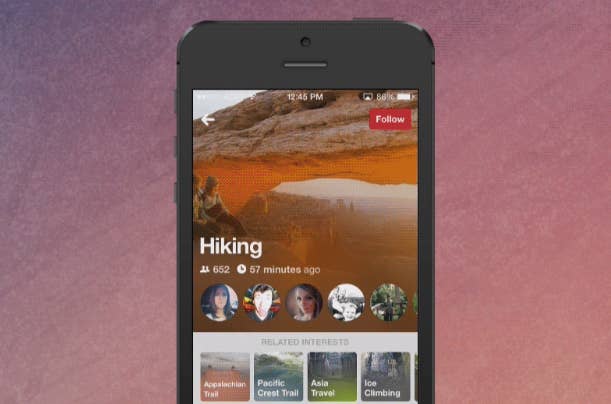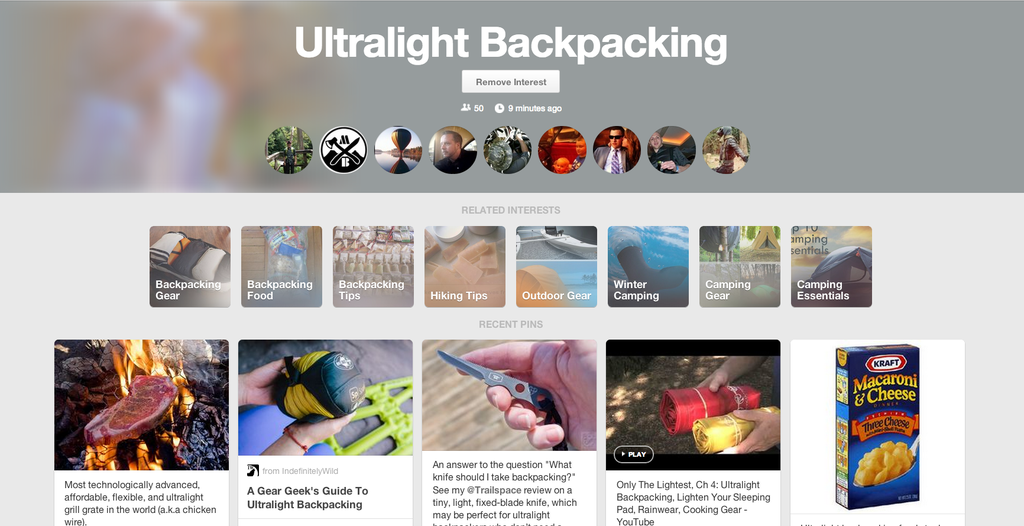
After investors spent the better part of a half-decade salivating over Pinterest's unique proposition of making it easier to discover content on the Web, the company has released two major updates that do just that in the past six months.
The second of those updates comes today in the form of a new way of discovering pins — pieces of content on Pinterest — by following what the company is calling "Interests." Whenever a Pinterest user follows a new interest, pins that fit that interest will now appear in the home feed of both the web and mobile versions of the application.
Interests can become incredibly specific. For example, instead of simply following the "cars and automobiles category" that Pinterest already had, a user can now specifically follow Ford cars, or even more specifically a year and model of that car. Users can follow and unfollow new interests much in the same way that they are able to drill down into newer and more specific search options.
"What occurred to us the last couple months, the category use case is pretty broad," Pinterest head of product management Tim Kendall said in an interview with BuzzFeed. "Boards are actually pretty granular. Because of the way boards are used, people create them and they might sit there for a while, and they're not an ongoing, persistent feed of content. We wanted to create something a little in between. Something that's not as granular as a board, and something that would populate with new content [on a regular basis]."

Pinterest's new interests component comes a few months after the company launched Guided Search, its own more visual take on a search engine that feels more like a flow chart than traditional search engines like Google. Instead of doing a series of searches based around keywords, Guided Search will offer related or more specific searches based on Pinterest's data. For example, when searching for shoes, Guided Search displays several tokens that are related to shoes — such as Nikes, sandals, or a specific kind of boot — based on what other users looked at in connection with that original search.
Since Guided Search launched earlier this year, searches across its Web and mobile products have also increased by 20%, the company said.
When new users sign up for Pinterest, they will also be asked to select a few interests right from the start. When Pinterest first launched, early adopters of the service very quickly jumped to the "collecting" phase of the service — meaning they were creating Pins and Pinboards. That has changed as the service has become more mainstream over time, Kendall said, with users spending more time searching for interesting Pins before creating Pins of their own.
"What we're seeing is, a lot of users are going through a longer discovery window before they move on to collect," Kendall said. "People are learning about the services as a way to discover new things. They're compelled by Guided Search, by this new product."
Any improvement in Pinterest's ability to surface interesting content to users — or products — that the users didn't know they were interested in can also improve its ability to make money. Pinterest raised $200 million in a financing round that valued the company at $5 billion in May this year, as it enters arguably one of the most risky parts of a startup's life cycle: beginning to monetize its users. In Pinterest's case, that means launching new advertising products like Promoted Pins, which it began testing in May.
As the amount of content on the web continues to grow at an incredible rate, services that surface the right pieces of content to the right people are growing increasingly valuable. Pinterest is widely considered in the investor community to have the best crack at helping users discover things — whether it's video, products, or even locations — on the web. That has natural commerce applications too, if advertisers are able to place certain products in front of the right people at the right time. For example, a pin for a Darth Vader outfit from a costume shop might be promoted in a search for "halloween," according to the company.
"Discovery's a hard problem, if you think about it offline there are two analogies," he said. "There's window shopping and the magazines on my bedside table. To create the digital version of that magazine stack is hard, to make it that rich and compelling. Part of the reason I joined the company was I thought discovery was hard and we had the opportunity to do for discovery what Google did for search."

